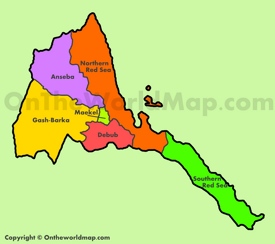Recently, the world have witnessed unforeseen new peace development on the horn of Africa. While this is good for economic, social, and cultural development for the region, but it also gave to the birth of the plan by Ethiopia to build naval base “adjacent to the Red Sea.” So, says General Berhanu Jula, Deputy Chief of Staff of the Ethiopian Armed Forces, really?. He said “We are consulting with other countries regarding the naval reinstatement, capacity, & structure, without being specific as to which countries he consult with. He additionally said “We must show our influence around the sea. Different countries are coming from far and creating influences on the sea. We are a great nation with over 100 million people. There is no any reason Ethiopia remains land locked.” Ethiopia is certainly a great nation in term of population, but Ethiopia must remember, that it is not France, Germany, China or America for that matter…. In addition, apart from a few patrol craft on lake Tana – what is General Berhanu thinking of? Where will these bases be? what kind of influence is thinking of ? over which countries does he want to show his influence?
What does ‘adjacent to’ the Red Sea mean, other than establishing bases at Assab or Massawa? President Isaias has travelled to Ethiopia more than three times, so the mystery is whether “naval bases” on the agenda of the tripartite meeting that President Isaias, Prime Minister Abiy and Somalia’s President Farmajo held in Gondar? From what we know, which is zero to none, the Eritrean people deserve a better information aside what we hear from Ethiopian and western media.
As there is no by-law, parliamentary, and known government structure, the current government of Eritrea is notorious in making deals solo, without consulting with the cabinets, let alone the Eritrean people. The three leaders have every right to discuss the proposals, but the naval base are major developments. Especially, it is a threat to national security of Eritrea to allow any other country to develop naval base near Eritrea, let alone adjacent to Red Sea. They need to be put to the people for their consideration. But while Ethiopia and Somalia have parliaments, Eritrea does not.
Without transparency and democratic buy-in, surely the Eritrean people have a right to question the legitimacy of what will inevitably require a reduction in their sovereignty?
We have read and known to know that President Isaias has already allowed Saudi Arabia and the UAE to develop bases at Assab (unverified news) . But allowing Ethiopia to return to their former bases would be another matter altogether.
Eritreans fought for independence for 30 years to end Ethiopian control over their sea and land territory. They defended it in the 1998 – 2000 border war. Tens of thousands laid down their lives. President Isaias must surely be open with the Eritrean people at the least the about what he plans, and obtain their consent.
The Eritrean history tells us, in 1955, the Imperial Ethiopian Navy was founded, with its primary base—the Haile Selassie I Naval Base—at Massawa. By the early 1960s workshops and other facilities were under construction at Massawa to give it complete naval base capabilities.
The Imperial Ethiopian Navy established four bases: Massawa was the site of the naval headquarters and enlisted training facilities; the naval air station and naval academy were at Asmara; Assab was the site of a naval station, enlisted training facilities, and a repair dock; and there was a naval station and communications station on the Dahlack Islands in the Red Sea near Massawa.
Ethiopian government speculated that strategic and geo-political security concerns could be driving the navy plan. In addition, “Ethiopia’s right to use international waters demands it has a naval base. The million-dollar question is where will the naval base be located. I suggest to Ethiopian government to start thinking Somaliland and Djibouti, if they must, as possible locations for the base. But the ports of Eritrea are unimaginable and unthinkable as the history of Eretria is any lessons learned. It is a noble idea to push for the “unification of the Horn of Africa as an economic bloc but the navy is not and should not be part of that project”. Eritreans do not want to return the barbaric era of the past.
